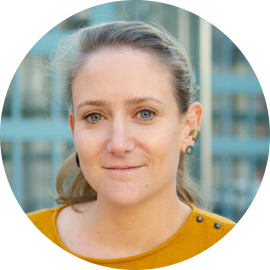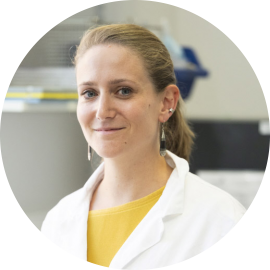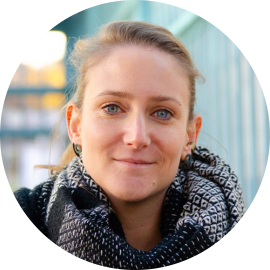"Nothing in life is to be feared, it is only to be understood." These words from Marie Curie neatly sum up the philosophy and career of Sarah Dellière. She is determined, optimistic and adventurous, and she loves stepping out of her comfort zone to embrace new experiences and further deepen her knowledge.
At the age of just 17, Sarah Dellière began traveling to far-flung corners of the world to complete internships and training: in the United States, at a hospital in Bogotá, Colombia, in an emergency room in Phnom Penh, Cambodia, and at McGill University in Montreal, Canada. She has qualifications in both medicine and research and is passionate about applying her clinical knowledge to advance the field of mycology.
Mickey Mouse or the Black Death?
Sarah Dellière was born in a small village near Saint-Nazaire in western France.
Her mother was a primary school teacher and her father a family physician, and Sarah spent her childhood in a stimulating yet relaxed environment. There was a television at home, but the only available channel was an English-speaking cartoon channel. The meadows around the house offered a wonderful environment for a budding explorer kitted out with a Swiss army knife, an insect box and a snack in her backpack. All she was told was not to wander too far afield. This was the environment that Sarah grew up in, and she decided at a very young age that she would become a doctor like her father.
Her parents still smile when they tell the story of the first time that Sarah was allowed to go to the corner shop on her own to buy a magazine. She didn't bring back the Mickey Mouse comic but instead picked out a special issue of Sciences et Vie Junior about the plague in the Middle Ages. Learning about infectious diseases soon became her hobby.
During her teenage years, she came to the conclusion that medicine alone would not answer all her questions about the living world, so she began to consider a career as a scientist.
Then, as a precocious 15-year-old, she decided that France was not necessarily the best place for biomedical research.
America: game, set and match
Before completing high school, she found an organization, the ISP Academy, that offered her an academic and sports scholarship for an American university. With her recently earned high school diploma, she set off for New Jersey aged just 17. Her school grades were excellent, and she joined the tennis team at Fairleigh Dickinson University, where she began a biology degree – a prerequisite to study medicine in the United States. She spent three hours a day training and playing tennis, not counting weekend matches.

It was clear that I was not going to become a professional tennis player as there were women who were much better than me. The university mainly chose me for my good school grades, which boosted the level of the team.
At the end of the year, she contacted the prestigious Columbia University. But the tuition fees for medical school were €50,000 a year, and no loans were available for foreign students...
France has its advantages... but travel broadens the mind
Determined not to let that stop her, Sarah came back to France to study medicine in Nantes, then followed her medical studies with a first-year Master's in microbiology. She completed her residency in microbiology in the Paris Public Hospital Network (AP-HP) and then took a year out for a second-year Master's in infectious diseases and immunology, specializing in mycology, at Paris Descartes University. After several weeks of theoretical and practical sessions, she jetted off once again for a 10-month research internship at McGill University in Canada, in Dr. Don Sheppard's team, where she had the opportunity to study the fungus she was particularly interested in, Aspergillus fumigatus.
Hard-working and adventurous, Sarah made the most of every vacation to seek out new experiences. She spent time volunteering for a charity in the Indian state of Andhra Pradesh, where she put on plays for children in orphanages to teach them about infectious diseases and first aid. Her natural curiosity and thirst for a challenge also led her to volunteer for two internships in infectious diseases: one at a hospital in Bogotá, Colombia, and the other in Calmette Hospital's emergency room in Phnom Penh, Cambodia.
Studying potentially lethal fungi
In 2020, she embarked on a PhD in science at the Institut Pasteur to explore the interactions between the human immune system and the pathogen Aspergillus fumigatus. Sarah defended her PhD in September 2023.
She now divides her time between the Institut Pasteur and her hospital work, which involves diagnosing parasitic and fungal infections.
|
Aspergillus fungi, a lethal danger? In microbiology, there are four broad families of pathogens for humans: bacteria, viruses, parasites, and – less well known – fungi. In the environment, fungi like Aspergillus fumigatus are everywhere; they are involved in breaking down dead matter and they co-exist perfectly well with the human immune system. But in transplant recipients or immunocompromised patients, and more recently in patients with a severe form of COVID-19, Aspergillus fumigatus is fatal in around 50% of invasive forms. It starts by colonizing the lungs, then proliferates and ends up attacking and destroying tissues. The agricultural sector uses fungicides to protect crop yields, and some strains of Aspergillus fumigatus have become resistant despite actually being harmless for crops. The fungicides currently used for patients are no longer as effective. |
At the Institut Pasteur, Sarah draws on the problems she encounters at the hospital to fuel her research. This translational approach led her to compare samples from non-infected and infected patients, and her observations revealed that the infected patients were missing certain proteins in their immune system.
She is currently exploring the following questions:
- Are fungi capable of destroying these immune system proteins?
- Was the patient's immune system already compromised before infection?
- Are the proteins fully consumed during interactions between the immune system and the pathogen, and are they in short supply?
One of these proteins, surfactant protein D, inhibits growth of the fungus and stimulates the inflammatory immune response to counter it. This protein, secreted by our alveolar cells, primarily serves to maintain tension in the pulmonary alveoli to avoid them collapsing and allow us to breathe. The protein is already used in premature infants to help them breathe more easily. It is not toxic and inhaling it could be effective as adjuvant therapy or for prevention/prophylaxis in highly immunocompromised patients at risk of developing invasive aspergillosis. Sarah and her team are currently attempting to elucidate the precise antifungal mechanism of this molecule and are exploring the feasibility of therapeutic trials in the near future.
Dual lab/hospital experience, beneficial for patients
Sarah is also exploring the problem of environmental resistance. She is currently the French investigator in a group of six European scientists working on a project to develop comprehensive, accessible rapid diagnostic techniques and to identify unknown resistance mechanisms.

It's a great opportunity for me to pursue my research at the Institut Pasteur. Here I have access to amazing technical facilities: the Biomics, Proteomics, Imaging, Molecular Biophysics and NMR cores are a unique resource in what is an increasingly complex field. The people who work at the facilities are experts and are always on hand to help us. Without them many of my projects would not have been possible.
As she continues her work in the lab led by Vishukumar Aimanianda, an expert in the pathophysiology of fungal microorganisms, Sarah is keen for the two of them to pool their respective knowledge in basic research and clinical practice to benefit patients as best as possible.

I am well aware that I will never have the highly specialized skills of a pure researcher or the field experience of a full-time hospital physician. But I hope that I can bridge the two by offering a broader view of what we need to do to respond to the challenges posed by infections. I hope that my passion in this area will rub off on the early career scientists and physicians I supervise, the students I teach, and – who knows – maybe also Lou, my 5-year-old daughter, if I can wrap pathophysiology up in "Once upon a time" bedtime stories!
Key dates in Sarah Dellière's career
2023: University lecturer
Hospital practitioner in parasitology and mycology at Saint-Louis Hospital (AP-HP – department led by Professor Alanio)
Scientist in the Immunobiology of Aspergillus Unit at the Institut Pasteur
2020-23: PhD in microbiology, supervised by Dr. Vishukumar Aimanianda: "Role of soluble mediators in anti-Aspergillus immunity"
2014-2019: Residency in microbiology in the Paris Public Hospital Network (AP-HP)
2019: ESCMID Summer School 2019 – Liverpool, United Kingdom
2018: Molecular Mycology Course – Woods Hole, MA, United States
2016-17: Second-year Master's in Infectious Diseases: Microbiology, Virology, Immunology (specializing in Mycology) – Paris Descartes University
2012-13: First-year Master's in Science, Technology and Health, specializing in Biology and Health – University of Nantes
2014: Internship in infectious diseases (2 months) at Clinica Colombia, Bogotá, Colombia
2012: Internship in emergency medicine (2 months) at Calmette Hospital, Phnom Penh, Cambodia
2007-08: Bachelor's degree in Biology – Fairleigh Dickinson University, Teaneck, NJ, United States. First year (Bachelor of Science). Academic and sports scholarship


